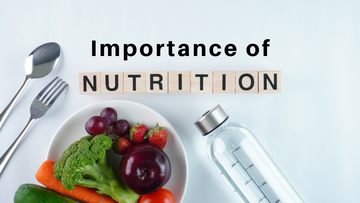In today's fast-paced world, where convenience often trumps quality, the significance of nutrition tends to be overlooked. Yet, nutrition fundamentally influences our health, well-being, and overall life satisfaction. What we consume provides the building blocks for our physical and mental functions, enabling us to perform optimally in our daily activities. From boosting our immune systems to enhancing our brain function, nutrition plays a crucial role that cannot be underestimated.
The modern lifestyle, characterized by processed foods and sedentary habits, has led to an increase in nutritional deficiencies and related health issues. Therefore, acknowledging the Importance of Nutrition can lead to conscious eating choices that promote long-term health and prevent diseases. This blog aims to delve into the essence of nutrition, its undeniable benefits, and practical ways to incorporate it into our everyday lives.
Also Read: The Vital Importance of Vitamins for Overall Well-Being
What Is Nutrition?
Nutrition involves the intake of food in relation to the body's dietary needs. It is a complex interaction between food, the nutrients within it, and how these compounds nourish, grow, and sustain our bodies. Nutrients are substances required by the body to perform various functions, including providing energy, contributing to body structure, and regulating chemical processes. These nutrients can be broadly classified into macronutrients (carbohydrates, proteins, and fats) and micronutrients (vitamins and minerals).
Carbohydrates serve as the primary energy source, proteins are essential for growth and repair, and fats are vital for energy storage and cell function. Vitamins and minerals, though needed in smaller quantities, are critical for various metabolic activities, immunity, and overall health maintenance. A balanced diet incorporates all of these nutrients in appropriate proportions, customized to individual needs, ensuring the body functions at its best.
What Is The Importance of Nutrition?
Supports Growth and Development: Nutrition is particularly critical during childhood, adolescence, and pregnancy. Proper nutrition ensures that children grow and develop correctly, both physically and mentally. Adequate intake of essential nutrients during these stages helps in the formation of strong bones, muscles, and overall body structure.
Prevents Chronic Diseases: A well-balanced diet rich in fruits, vegetables, whole grains, and lean proteins can significantly reduce the risk of chronic diseases such as heart disease, diabetes, and obesity. Nutrients such as antioxidants help protect cells from damage, reducing inflammation and preventing disease progression.
Boosts Immune Function: Nutrition directly influences our immune system. Nutrients like vitamins A, C, E, and minerals such as zinc and selenium strengthen the immune response, making the body more resilient against infections and illnesses.
Enhances Mental Health: The brain requires specific nutrients to function efficiently. Deficiencies in essential vitamins and minerals can lead to mental health issues such as depression, anxiety, and cognitive decline. Omega-3 fatty acids, for instance, are crucial for brain health and function.
Improves Energy Levels: Proper nutrition ensures that the body gets the required energy to function effectively throughout the day. Complex carbohydrates provide sustained energy, while proteins and fats support metabolic activities, keeping energy levels stable.
Also Read: Vitamins and Minerals Difference: Understanding Their Unique Roles in Health
Why Do We Need Nutrition?
For Energy Production: The body requires energy to perform all its functions, from basic cellular activities to complex physical movements. Carbohydrates, proteins, and fats broken down in the digestive system provide this essential energy.
For Tissue Growth and Repair: Proteins are vital for the growth and repair of tissues. Whether it’s muscle repair after a workout or the healing of an injury, nutrition plays an essential role in tissue regeneration.
To Support Metabolic Functions: Nutrients act as co-factors in enzymatic reactions that drive metabolic activities. Vitamins and minerals support processes such as digestion, energy production, and detoxification.
For Hormonal Balance: Essential fatty acids and proteins are necessary for hormone production and balance. Hormones regulate critical bodily functions such as growth, metabolism, and reproductive health.
To Maintain a Healthy Weight: Consuming the right balance of nutrients helps in maintaining a healthy weight, preventing conditions like obesity and metabolic syndrome, which are linked to various health risks.
How To Consume Required Nutrition
Eat a Balanced Diet: Incorporate a variety of foods from different food groups to ensure a balanced intake of essential nutrients. Include fruits, vegetables, whole grains, lean proteins, and healthy fats.
Focus on Portion Control: Eating in moderation is key to obtaining the right amount of nutrients without overindulging. Portion control helps in maintaining a healthy weight and prevents nutrient deficiencies.
Stay Hydrated: Water plays a crucial role in nutrient transport and metabolic functions. Ensure you drink adequate amounts of water daily to support overall health.
Limit Processed Foods: Processed foods often contain high levels of unhealthy fats, sugars, and salts, and lack essential nutrients. Opt for whole, minimally processed foods to obtain maximum nutritional benefits.
Include Nutrient-Dense Foods: Nutrient-dense foods provide high levels of vitamins, minerals, and other beneficial compounds relative to their calorie content. Examples include leafy greens, berries, nuts, and seeds.
Also Read: Discover Top 15 Immune Boosting Foods for Healthier Living
Conclusion
Recognizing the Importance of Nutrition is the first step toward cultivating a healthier lifestyle. Good nutrition provides the foundation for physical development, disease prevention, mental well-being, and sustained energy levels. By focusing on balanced diets, portion control, and hydration, we can ensure our bodies receive the essential nutrients they need to thrive. Moreover, making informed dietary choices can prevent chronic diseases and improve quality of life, proving that what we eat truly shapes who we are. Let us commit to nourishing our bodies, acknowledging that the benefits of proper nutrition extend far beyond the plate.








